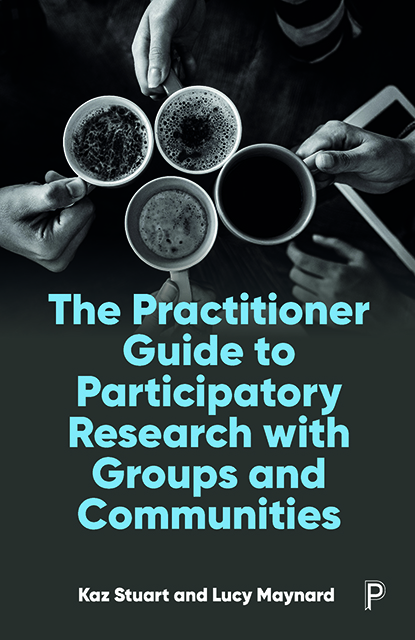Book contents
- Frontmatter
- Contents
- List of Figures and Tables
- Glossary
- About the Authors
- Acknowledgements
- Foreword
- Foreword
- Introduction
- 1 Just What is Participatory Research?
- 2 How do We Begin to Plan Our Participatory Research Project?
- 3 What Do We Want to Explore and Why?
- 4 What Ideas are the Foundations of Our Research?
- 5 How Will We go About Exploring Our Questions?
- 6 Who Can Get Involved to Explore Our Questions?
- 7 How Shall We Collect Our Data?
- 8 What Do We Do With Our Data?
- 9 How Do We Get Our Messages Out There?
- 10 How Do We Keep Everyone Safe?
- 11 Doing and Reviewing Participatory Research
- Conclusion
- References
- Index
5 - How Will We go About Exploring Our Questions?
Published online by Cambridge University Press: 21 June 2023
- Frontmatter
- Contents
- List of Figures and Tables
- Glossary
- About the Authors
- Acknowledgements
- Foreword
- Foreword
- Introduction
- 1 Just What is Participatory Research?
- 2 How do We Begin to Plan Our Participatory Research Project?
- 3 What Do We Want to Explore and Why?
- 4 What Ideas are the Foundations of Our Research?
- 5 How Will We go About Exploring Our Questions?
- 6 Who Can Get Involved to Explore Our Questions?
- 7 How Shall We Collect Our Data?
- 8 What Do We Do With Our Data?
- 9 How Do We Get Our Messages Out There?
- 10 How Do We Keep Everyone Safe?
- 11 Doing and Reviewing Participatory Research
- Conclusion
- References
- Index
Summary
Chapter overview
We have defined our purpose and aims, set out research questions and identified our underpinning research philosophy. Now we are going to focus on the next level of detail – how we approach the research. This takes us from the more abstract and philosophical ideas into a more practical discussion of how we ‘do’ research. This chapter will explain what research methods are and give an overview of participatory methods. We’ll then go on to provide a summary of the rest of the considerations within the research approach before the subsequent chapters tackle each of these parts in turn, guiding you through the choices you may need to make with the co-researchers. We will introduce three case studies within this chapter – adding more applied research experiences to abstract tea drinking. These are fictional case studies to emphasise key ideas. They are constructed through our own experiences and the experiences of other participatory researchers.
Aligning our research approach
As we have already discussed, the alignment between all the research steps is crucial and particularly so here, moving from philosophy to approach. If there is a misalignment then the final research is unlikely to meet its purpose and aims.
Our research approach consists of several smaller building blocks. These steps are considerations in the research approach, making the process you follow clear and ensuring you have a plan – this is especially important when working with co-researchers. The steps are:
• The methods you’ll approach the research with – we described these broadly in the previous chapter as qualitative, quantitative and mixed methods.
• The sample or research participants – who you and the co-researchers will involve in the research; how you will recruit them; what will engage them.
• The data collection tools – the specific ways in which you will collect data, for example interviews or surveys.
• Data analysis – the ways in which you will analyse the data you have collected to generate findings.
• Research ethics – the ways in which you plan to keep everyone safe in the research.
• Quality measures – how you plan to ensure the research is of good quality.
• The dissemination strategy – how you will share and communicate your research findings to the wider world.
- Type
- Chapter
- Information
- Publisher: Bristol University PressPrint publication year: 2022



